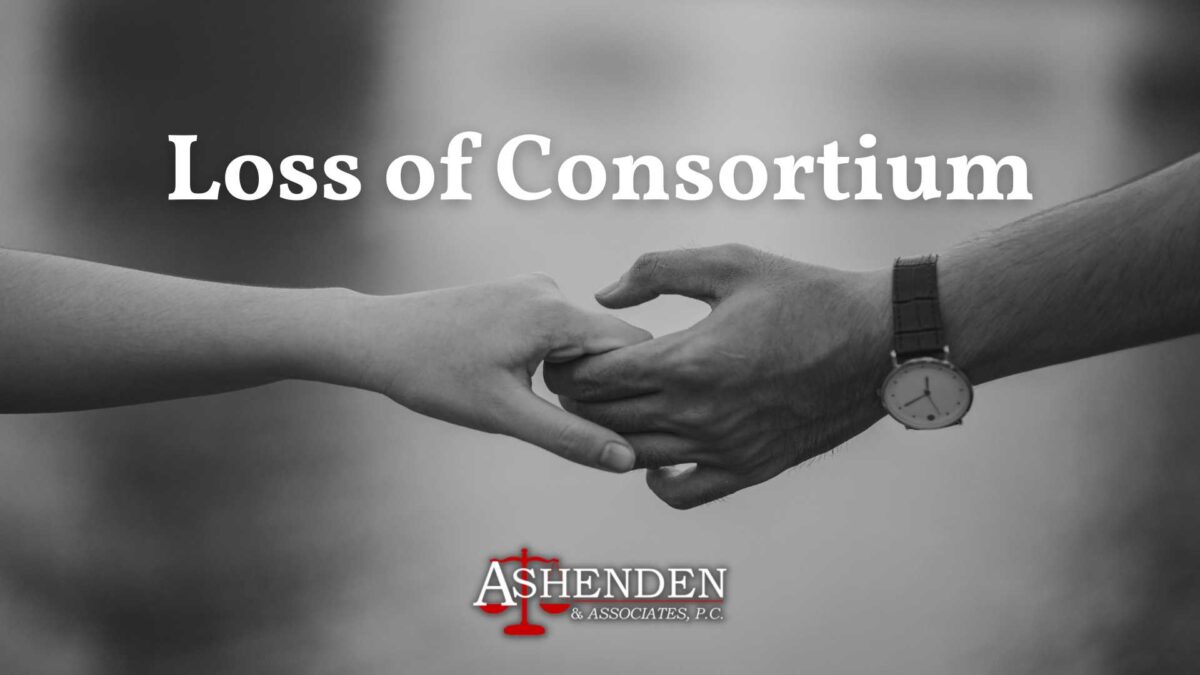What is loss of consortium? How are loss of consortium damages calculated? How does someone file claims for loss of parental consortium or filial consortium cases?
At Ashenden & Associates, we understand the profound impact that a personal injury can have. One often overlooked aspect of personal injury claims is the loss of consortium. Loss of consortium refers to the significant emotional, companionship, and support losses suffered by an injured individual’s spouse or family members. Our Sandy Springs personal injury attorneys are committed to advocating for the full scope of damages our clients and their families endure, ensuring that the complexities of loss of consortium claims are carefully navigated and rightfully addressed in pursuit of the justice and compensation you deserve.
To discuss your personal injury claim and loss of consortium damages, call Ashenden & Associates at 770-394-8909 to meet with a compassionate Sandy Springs personal injury attorney.

What is Loss of Consortium?
Loss of consortium is a legal claim that arises in personal injury cases, designed to compensate the spouse or close family members of a person who has been injured or killed due to another’s negligence or wrongful actions. This claim acknowledges the non-economic damages and intimate aspects suffered by the loved ones, encompassing the relationship loss of a spouse, the parent-child relationship of a child or another family member, covering companionship, emotional support, and sexual relations that the injured party can no longer provide.
It highlights the ripple effect of personal injuries, extending beyond the immediate physical harm to touch the fabric of familial and spousal relationships, highlighting the emotional and psychological impact that such injuries can inflict on the victim’s closest relationships.
What Does Loss of Consortium Mean in a Personal Injury Claim?
In personal injury claims, loss of consortium represents a distinct element of damages that acknowledges the deep, non-physical impact a serious injury can have on the injured person’s spouse or family members.
It surpasses tangible losses, such as income or medical bills, to address the intangible yet priceless aspects of human relationships affected by the injury. This can include the loss of companionship, affection, support, and marital benefits, among other elements of a close personal relationship that have been compromised or lost due to the injury.
Who Can File a Loss of Consortium Claim?
In Georgia, a loss of consortium claim can only be filed by the spouse of the injury victim. In other states, this legal right extends to the children, parents, or domestic partners. However, Georgia only allows spouses this right, acknowledging the powerful impact an injury can have on marital relationships.
The claim emphasizes the intangible losses the non-injured spouse endures, including companionship, emotional support, and the many facets of marital life that have been compromised. This focus on the spouse’s claim within the state recognizes the deep, personal loss experienced at the marital level when tragedy strikes one partner.
Elements of Loss of Consortium Claims

For a loss of consortium claim to be valid in a personal injury case, it must meet the following critical elements:
- There is a Lawful Marriage: This establishes the legal relationship between the spouse and the injured party, confirming the spouse’s right to file the claim.
- The Spouse Suffers a Catastrophic Injury or Wrongful Death: The severity of the injury or the occurrence of wrongful death is the event that triggers the potential for a loss of consortium claim.
- There is a Loss of Consortium: The claimant must demonstrate a significant loss in marital or domestic partnership benefits, such as companionship, emotional support, and intimacy.
- There’s a Clear Connection Between the Loss of Consortium and the Injury or Death: It must be evident that the loss of consortium directly results from the spouse’s catastrophic accident or wrongful death, connecting the claimant’s damages to the precipitating event.
Together, these four elements form the foundation of a valid loss of consortium claim, setting the stage for legal recourse and compensation for the affected spouse.
Loss of Consortium Examples in Georgia
When exploring the concept of loss of consortium, examples of injury victims can provide clear insight into the varied and profound impacts that a spouse’s injury or death can have on their partner. These examples illustrate not just the emotional toll but also the tangible disruptions to daily life and companionship that loss of consortium encompasses.
By examining these scenarios, we can better understand the depth and extent of loss of consortium claims and the vital importance of acknowledging these non-economic damages in personal injury claims.
Spinal Injury Loss of Consortium Claim
In an example of a spinal injury loss of consortium claim, consider the case of a married couple where one partner sustains a severe spinal injury in a car accident caused by a reckless driver. Before the accident, the couple enjoyed an active lifestyle together, including hiking, social outings, and mutual support in their personal and professional lives.
However, this results in paralysis for the injured partner. The non-injured spouse is thrust into the role of primary caregiver while also struggling with the emotional distress of seeing their partner in a state of dependency.
The loss of consortium claim in this scenario would seek to address not only the tangible changes in their day-to-day lives but also the profound emotional and psychological toll on the relationship, highlighting the diminished companionship, support, and intimacy that once thrived between them. Our Sandy Springs spine injury lawyers can help victims through the loss of consortium claims.
Brain Injury Loss of Consortium Claim
In an illustrative case of a brain injury loss of consortium claim, imagine a scenario where one spouse suffers a TBI due to a fall at a poorly maintained commercial property. Before the accident, the couple shared a deep emotional connection, engaging in intellectual conversations, shared decision-making, and mutual support.
Unfortunately, the TBI leads to significant cognitive impairments, personality changes, and emotional volatility in the injured partner, disrupting the couple’s emotional and intellectual bond. The non-injured spouse faces the heartbreak of losing the essence of the person they married, as the aftermath of the accident imposes barriers to communication, shared experiences, and the emotional intimacy that once defined their relationship.
Our Sandy Springs TBI lawyers also help victims throughout Atlanta with loss of consortium claims.
Catastrophic Injury Loss of Consortium Claim
In an example of a catastrophic injury loss of consortium claim, imagine a situation where one spouse becomes severely disabled following a devastating industrial accident. This catastrophic injury results in permanent disability, rendering the injured partner unable to walk, requiring round-the-clock care, and suffering from chronic pain and psychological trauma. Before the accident, the couple shared a life filled with mutual activities, responsibilities, and plans for the future, including raising children, traveling, and growing old together. The catastrophic nature of the injury shatters these shared dreams, placing an immense burden on the non-injured spouse, who must now navigate medical appointments, caregiving duties, and financial strain, all while coping with the grief of losing the partnership they once had.
Our Sandy Springs catastrophic injury lawyers understand the long-term implications of these accidents and can help ensure consortium claims are heard through the personal injury claim process.
Amputation Loss of Consortium Claim
In a distressing case of an amputation loss of consortium claim, consider a scenario where one spouse loses a limb in a severe construction accident. Prior to this life-altering event, the couple enjoyed physical activities like dancing, hiking, and home renovation projects. The amputation not only imposes physical limitations on the injury victim but also inflicts deep emotional scars, affecting their self-esteem and independence.
Our Sandy Springs amputation attorneys can help with the loss of consortium claims related to amputations.
Wrongful Death Loss of Consortium Claim
In an example of a wrongful death loss of consortium claim, picture a scenario in which one spouse tragically loses their life in a preventable car accident caused by a drunk driver. Before this devastating loss, the couple shared a life full of love, dreams, and plans for the future, including raising a family, building a home together, and supporting each other’s personal and professional aspirations.
The untimely death shatters the surviving spouse’s world, leaving them to face a future devoid of their partner’s love, companionship, and support. The profound emotional void and the loss of parental partnership and shared life responsibilities stress the claim.
Our Sandy Springs wrongful death lawyers understand how difficult navigating loss of consortium claims can be and are here to help.
How Do You Calculate Loss of Consortium Damages?

Calculating the loss of consortium damages is challenging due to the subjective nature of the losses involved. Unlike economic damages, which can be quantified, loss of consortium includes intangible elements such as companionship, emotional support, and marital intimacy.
Courts and legal professionals typically consider various factors to assess these damages, including the depth and quality of the marital relationship before the injury, the life expectancy of both parties and the extent to which the injury affects the marriage relationship.
Testimonies from the spouse, family members, and friends, alongside expert opinions from psychologists or therapists, may also contribute to painting a comprehensive picture of the relationship’s dynamics pre and post-injury.
Each case is unique, and while there’s no precise formula, the goal is to arrive at a compensation figure that acknowledges the profound personal loss experienced by the non-injured partner, reflecting the significant alteration in the marital relationship and the overall emotional well-being of the spouse.
Loss of Consortium Settlement Amounts
Determining an average settlement for loss of consortium claims is challenging due to the highly individualized nature of each case. Settlement amounts can vary, influenced by factors such as the severity of the injury, the influence on the marital relationship, and the jurisdiction’s legal standards.
More severe injuries that drastically change the dynamics of a marriage or partnership often result in higher settlements. However, it’s important to note that no standard benchmark or average figure is universally applicable, as each loss of consortium claim is deeply personal and assessed on its own worth.

Have You Suffered Loss of Consortium Due to an Injured Spouse? Call Sandy Springs Personal Injury Attorneys Today
If you are struggling with the impact of loss of consortium, it is important to recognize that you are not alone in this journey. At Ashenden & Associates, we understand the depth of your loss and are committed to advocating for your rights, ensuring that the full scope of your emotional and relational damages is acknowledged and compensated.
Contact Ashenden & Associates at 770-394-8909 to schedule a consultation with an experienced Sandy Springs personal injury attorney. Let us help you navigate the path towards justice and healing, restoring peace and stability to your life in the aftermath of such a significant loss.
